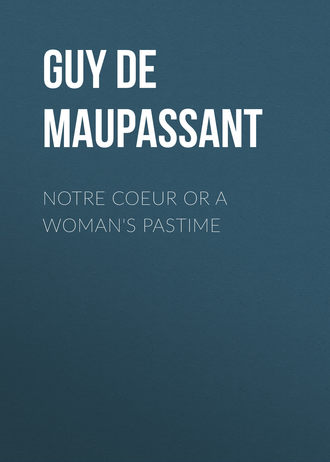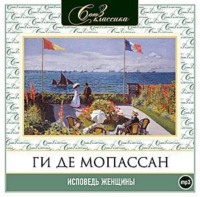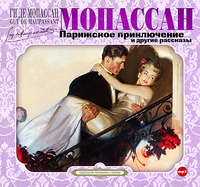 полная версия
полная версияNotre Coeur or A Woman's Pastime
The four intervening days were horribly long ones to him. He got through them somehow in Paris without seeing a soul, preferring silence to conversation, and solitude to the company of friends.
On Friday morning, therefore, he boarded the eight-o'clock express. The anticipation of the journey had made him feverish, and he had not slept a wink. The darkness of his room and its silence, broken only by the occasional rattling of some belated cab that served to remind him of his longing to be off, had weighed upon him all night long like a prison.
At the earliest ray of light that showed itself between his drawn curtains, the gray, sad light of early morning, he jumped from his bed, opened the window, and looked at the sky. He had been haunted by the fear that the weather might be unfavorable. It was clear. There was a light floating mist, presaging a warm day. He dressed more quickly than was needful, and in his consuming impatience to get out of doors and at last begin his journey he was ready two hours too soon, and nothing would do but his valet must go out and get a cab lest they should all be gone from the stand. As the vehicle jolted over the stones, its movements were so many shocks of happiness to him, but when he reached the Mont Parnasse station and found that he had fifty minutes to wait before the departure of the train, his spirits fell again.
There was a compartment disengaged; he took it so that he might be alone and give free course to his reveries. When at last he felt himself moving, hurrying along toward her, soothed by the gentle and rapid motion of the train, his eagerness, instead of being appeased, was still further excited, and he felt a desire, the unreasoning desire of a child, to push with all his strength against the partition in front of him, so as to accelerate their speed. For a long time, until midday, he remained in this condition of waiting expectancy, but when they were past Argentan his eyes were gradually attracted to the window by the fresh verdure of the Norman landscape.
The train was passing through a wide, undulating region, intersected by valleys, where the peasant holdings, mostly in grass and apple-orchards, were shut in by great trees, the thick-leaved tops of which seemed to glow in the sunlight. It was late in July, that lusty season when this land, an abundant nurse, gives generously of its sap and life. In all the inclosures, separated from each other by these leafy walls, great light-colored oxen, cows whose flanks were striped with undefined figures of odd design, huge, red, wide-fronted bulls of proud and quarrelsome aspect, with their hanging dewlaps of hairy flesh, standing by the fences or lying down among the pasturage that stuffed their paunches, succeeded each other, until there seemed to be no end to them in this fresh, fertile land, the soil of which appeared to exude cider and fat sirloins. In every direction little streams were gliding in and out among the poplars, partially concealed by a thin screen of willows; brooks glittered for an instant among the herbage, disappearing only to show themselves again farther on, bathing all the scene in their vivifying coolness. Mariolle was charmed at the sight, and almost forgot his love for a moment in his rapid flight through this far-reaching park of apple-trees and flocks and herds.
When he had changed cars at Folligny station, however, he was again seized with an impatient longing to be at his destination, and during the last forty minutes he took out his watch twenty times. His head was constantly turned toward the window of the car, and at last, situated upon a hill of moderate height, he beheld the city where she was waiting for his coming. The train had been delayed, and now only an hour separated him from the moment when he was to come upon her, by chance, on the public promenade.
He was the only passenger that climbed into the hotel omnibus, which the horses began to drag up the steep road of Avranches with slow and reluctant steps. The houses crowning the heights gave to the place from a distance the appearance of a fortification. Seen close at hand it was an ancient and pretty Norman city, with small dwellings of regular and almost similar appearance built closely adjoining one another, giving an aspect of ancient pride and modern comfort, a feudal yet peasant-like air.
As soon as Mariolle had secured a room and thrown his valise into it, he inquired for the street that led to the Botanical Garden and started off in the direction indicated with rapid strides, although he was ahead of time. But he was in hopes that perhaps she also would be on hand early. When he reached the iron railings, he saw at a glance that the place was empty or nearly so. Only three old men were walking about in it, bourgeois to the manner born, who probably were in the habit of coming there daily to cheer their leisure by conversation, and a family of English children, lean-legged boys and girls, were playing about a fair-haired governess whose wandering looks showed that her thoughts were far away.
Mariolle walked straight ahead with beating heart, looking scrutinizingly up and down the intersecting paths. He came to a great alley of dark green elms which cut the garden in two portions crosswise and stretched away in its center, a dense vault of foliage; he passed through this, and all at once, coming to a terrace that commanded a view of the horizon, his thoughts suddenly ceased to dwell upon her whose influence had brought him hither.
From the foot of the elevation upon which he was standing spread an illimitable sandy plain that stretched away in the distance and blended with sea and sky. Through it rolled a stream, and beneath the azure, aflame with sunlight, pools of water dotted it with luminous sheets that seemed like orifices opening upon another sky beneath. In the midst of this yellow desert, still wet and glistening with the receding tide, at twelve or fifteen kilometers from the shore rose a pointed rock of monumental profile, like some fantastic pyramid, surmounted by a cathedral. Its only neighbor in these immense wastes was a low, round backed reef that the tide had left uncovered, squatting among the shifting ooze: the reef of Tombelaine. Farther still away, other submerged rocks showed their brown heads above the bluish line of the waves, and the eye, continuing to follow the horizon to the right, finally rested upon the vast green expanse of the Norman country lying beside this sandy waste, so densely covered with trees that it had the aspect of a limitless forest. It was all Nature offering herself to his vision at a single glance, in a single spot, in all her might and grandeur, in all her grace and freshness, and the eye turned from those woodland glimpses to the stern apparition of the granite mount, the hermit of the sands, rearing its strange Gothic form upon the far-reaching strand.
The strange pleasure which in other days had often made Mariolle thrill, in the presence of the surprises that unknown lands preserve to delight the eyes of travelers, now took such sudden possession of him that he remained motionless, his feelings softened and deeply moved, oblivious of his tortured heart. At the sound of a striking bell, however, he turned, suddenly repossessed by the eager hope that they were about to meet. The garden was still almost untenanted. The English children had gone; the three old men alone kept up their monotonous promenade. He came down and began to walk about like them.
Immediately – in a moment – she would be there. He would see her at the end of one of those roads that centered in this wondrous terrace. He would recognize her form, her step, then her face and her smile; he would soon be listening to her voice. What happiness! What delight! He felt that she was near him, somewhere, invisible as yet, but thinking of him, knowing that she was soon to see him again.
With difficulty he restrained himself from uttering a little cry. For there, down below, a blue sunshade, just the dome of a sunshade, was visible, gliding along beneath a clump of trees. It must be she; there could be no doubt of it. A little boy came in sight, driving a hoop before him; then two ladies, – he recognized her, – then two men: her father and another gentleman. She was all in blue, like the heavens in springtime. Yes, indeed! he recognized her, while as yet he could not distinguish her features; but he did not dare to go toward her, feeling that he would blush and stammer, that he would be unable to account for this chance meeting beneath M. de Pradon's suspicious glances.
He went forward to meet them, however, keeping his field-glass to his eye, apparently quite intent on scanning the horizon. She it was who addressed him first, not even taking the trouble to affect astonishment.
"Good day, M. Mariolle," she said. "Isn't it splendid?"
He was struck speechless by this reception, and knew not what tone to adopt in reply. Finally he stammered: "Ah, it is you, Madame; how glad I am to meet you! I wanted to see something of this delightful country."
She smiled as she replied: "And you selected the very time when I chanced to be here. That was extremely kind of you." Then she proceeded to make the necessary introductions. "This is M. Mariolle, one of my dearest friends; my aunt, Mme. Valsaci; my uncle, who builds bridges."
When salutations had been exchanged. M. de Pradon and the young man shook hands rather stiffly and the walk was continued.
She had made room for him between herself and her aunt, casting upon him a very rapid glance, one of those glances which seem to indicate a weakening determination.
"How do you like the country?" she asked.
"I think that I have never beheld anything more beautiful," he replied.
"Ah! if you had passed some days here, as I have just been doing, you would feel how it penetrates one. The impression that it leaves is beyond the power of expression. The advance and retreat of the sea upon the sands, that grand movement that is going on unceasingly, that twice a day floods all that you behold before you, and so swiftly that a horse galloping at top speed would scarce have time to escape before it – this wondrous spectacle that Heaven gratuitously displays before us, I declare to you that it makes me forgetful of myself. I no longer know myself. Am I not speaking the truth, aunt?"
Mme. Valsaci, an old, gray-haired woman, a lady of distinction in her province and the respected wife of an eminent engineer, a supercilious functionary who could not divest himself of the arrogance of the school, confessed that she had never seen her niece in such a state of enthusiasm. Then she added reflectively: "It is not surprising, however, when, like her, one has never seen any but theatrical scenery."
"But I go to Dieppe and Trouville almost every year."
The old lady began to laugh. "People only go to Dieppe and Trouville to see their friends. The sea is only there to serve as a cloak for their rendezvous." It was very simply said, perhaps without any concealed meaning.
People were streaming along toward the terrace, which seemed to draw them to it with an irresistible attraction. They came from every quarter of the garden, in spite of themselves, like round bodies rolling down a slope. The sinking sun seemed to be drawing a golden tissue of finest texture, transparent and ethereally light, behind the lofty silhouette of the abbey, which was growing darker and darker, like a gigantic shrine relieved against a veil of brightness. Mariolle, however, had eyes for nothing but the adored blond form walking at his side, wrapped in its cloud of blue. Never had he beheld her so seductive. She seemed to him to have changed, without his being able to specify in what the change consisted; she was bright with a brightness he had never seen before, which shone in her eyes and upon her flesh, her hair, and seemed to have penetrated her soul as well, a brightness emanating from this country, this sky, this sunlight, this verdure. Never had he known or loved her thus.
He walked at her side and could find no word to say to her. The rustle of her dress, the occasional touch of her arm, the meeting, so mutely eloquent, of their glances, completely overcame him. He felt as if they had annihilated his personality as a man – felt himself suddenly obliterated by contact with this woman, absorbed by her to such an extent as to be nothing; nothing but desire, nothing but appeal, nothing but adoration. She had consumed his being, as one burns a letter.
She saw it all very clearly, understood the full extent of her victory, and thrilled and deeply moved, feeling life throb within her, too, more keenly among these odors of the country and the sea, full of sunlight and of sap, she said to him: "I am so glad to see you!" Close upon this, she asked: "How long do you remain here?"
He replied: "Two days, if to-day counts for a day." Then, turning to the aunt: "Would Mme. Valsaci do me the honor to come and spend the day to-morrow at Mont Saint-Michel with her husband?"
Mme. de Burne made answer for her relative: "I will not allow her to refuse, since we have been so fortunate as to meet you here."
The engineer's wife replied: "Yes, Monsieur, I accept very gladly, upon the condition that you come and dine with me this evening."
He bowed in assent. All at once there arose within him a feeling of delirious delight, such a joy as seizes you when news is brought that the desire of your life is attained. What had come to him? What new occurrence was there in his life? Nothing; and yet he felt himself carried away by the intoxication of an indefinable presentiment.
They walked upon the terrace for a long time, waiting for the sun to set, so as to witness until the very end the spectacle of the black and battlemented mount drawn in outline upon a horizon of flame. Their conversation now was upon ordinary topics, such as might be discussed in presence of a stranger, and from time to time Mme. de Burne and Mariolle glanced at each other. Then they all returned to the villa, which stood just outside Avranches in a fine garden, overlooking the bay.
Wishing to be prudent, and a little disturbed, moreover, by M. de Pradon's cold and almost hostile attitude toward him, Mariolle withdrew at an early hour. When he took Mme. de Burne's hand to raise it to his lips, she said to him twice in succession, with a peculiar accent: "Till to-morrow! Till to-morrow!"
As soon as he was gone M. and Mme. Valsaci, who had long since habituated themselves to country ways, proposed that they should go to bed.
"Go," said Mme. de Burne. "I am going to take a walk in the garden."
"So am I," her father added.
She wrapped herself in a shawl and went out, and they began to walk side by side upon the white-sanded alleys which the full moon, streaming over lawn and shrubbery, illuminated as if they had been little winding rivers of silver.
After a silence that had lasted for quite a while, M. de Pradon said in a low voice: "My dear child, you will do me the justice to admit that I have never troubled you with my counsels?"
She felt what was coming, and was prepared to meet his attack. "Pardon me, papa," she said, "but you did give me one, at least."
"I did?"
"Yes, yes."
"A counsel relating to your way of life?"
"Yes; and a very bad one it was, too. And so, if you give me any more, I have made up my mind not to follow them."
"What was the advice that I gave you?"
"You advised me to marry M. de Burne. That goes to show that you are lacking in judgment, in clearness of insight, in acquaintance with mankind in general and with your daughter in particular."
"Yes I made a mistake on that occasion; but I am sure that I am right in the very paternal advice that I feel called upon to give you at the present juncture."
"Let me hear what it is. I will accept as much of it as the circumstances call for."
"You are on the point of entangling yourself."
She laughed with a laugh that was rather too hearty, and completing the expression of his idea, said: "With M. Mariolle, doubtless?"
"With M. Mariolle."
"You forget," she rejoined, "the entanglements that I have already had with M. de Maltry, with M. Massival, with M. Gaston de Lamarthe, and a dozen others, of all of whom you have been jealous; for I never fall in with a man who is nice and willing to show a little devotion for me but all my flock flies into a rage, and you first of all, you whom nature has assigned to me as my noble father and general manager."
"No, no, that is not it," he replied with warmth; "you have never compromised your liberty with anyone. On the contrary you show a great deal of tact in your relations with your friends."
"My dear papa, I am no longer a child, and I promise you not to involve myself with M. Mariolle any more than I have done with the rest of them; you need have no fears. I admit, however, that it was at my invitation that he came here. I think that he is delightful, just as intelligent as his predecessors and less egotistical; and you thought so too, up to the time when you imagined that you had discovered that I was showing some small preference for him. Oh, you are not so sharp as you think you are! I know you, and I could say a great deal more on this head if I chose. As M. Mariolle was agreeable to me, then, I thought it would be very nice to make a pleasant excursion in his company, quite by chance, of course. It is a piece of stupidity to deprive ourselves of everything that can amuse us when there is no danger attending it. And I incur no danger of involving myself, since you are here."
She laughed openly as she finished, knowing well that every one of her words had told, that she had tied his tongue by the adroit imputation of a jealousy of Mariolle that she had suspected, that she had instinctively scented in him for a long time past, and she rejoiced over this discovery with a secret, audacious, unutterable coquetry. He maintained an embarrassed and irritated silence, feeling that she had divined some inexplicable spite underlying his paternal solicitude, the origin of which he himself did not care to investigate.
"There is no cause for alarm," she added. "It is quite natural to make an excursion to Mont Saint-Michel at this time of the year in company with you, my father, my uncle and aunt, and a friend. Besides no one will know it; and even if they do, what can they say against it? When we are back in Paris I will reduce this friend to the ranks again, to keep company with the others."
"Very well," he replied. "Let it be as if I had said nothing."
They took a few steps more; then M. de Pradon asked:
"Shall we return to the house? I am tired; I am going to bed."
"No; the night is so fine. I am going to walk awhile yet."
He murmured meaningly: "Do not go far away. One never knows what people may be around."
"Oh, I will be right here under the windows."
"Good night, then, my dear child."
He gave her a hasty kiss upon the forehead and went in. She took a seat a little way off upon a rustic bench that was set in the ground at the foot of a great oak. The night was warm, filled with odors from the fields and exhalations from the sea and misty light, for beneath the full moon shining brightly in the cloudless sky a fog had come up and covered the waters of the bay. Onward it slowly crept, like white smoke-wreaths, hiding from sight the beach that would soon be covered by the incoming tide.
Michèle de Burne, her hands clasped over her knees and her dreamy eyes gazing into space, sought to look into her heart through a mist that was as impenetrable and pale as that which lay upon the sands. How many times before this, seated before her mirror in her dressing-room at Paris, had she questioned herself:
"What do I love? What do I desire? What do I hope for? What am I?"
Apart from the pleasure of being beautiful, and the imperious necessity which she felt of pleasing, which really afforded her much delight, she had never been conscious of any appeal to her heart beyond some passing fancy that she had quickly put her foot upon. She was not ignorant of herself, for she had devoted too much of her time and attention to watching and studying her face and all her person not to have been observant of her feelings as well. Up to the present time she had contented herself with a vague interest in that which is the subject of emotion in others, but was powerless to impassion her, or capable at best of affording her a momentary distraction.
And yet, whenever she had felt a little warmer liking for anyone arising within her, whenever a rival had tried to take away from her a man whom she valued, and by arousing her feminine instincts had caused an innocuous fever of attachment to simmer gently in her veins, she had discovered that these false starts of love had caused her an emotion that was much deeper than the mere gratification of success. But it never lasted. Why? Perhaps because she was too clear-sighted; because she allowed herself to become wearied, disgusted. Everything that at first had pleased her in a man, everything that had animated, moved, and attracted her, soon appeared in her eyes commonplace and divested of its charm. They all resembled one another too closely, without ever being exactly similar, and none of them had yet presented himself to her endowed with the nature and the merits that were required to hold her liking sufficiently long to guide her heart into the path of love.
Why was this so? Was it their fault or was it hers? Were they wanting in the qualities which she was looking for, or was it she who was deficient in the attribute that makes one loved? Is love the result of meeting with a person whom one believes to have been created expressly for himself, or is it simply the result of having been born with the faculty of loving? At times it seemed to her that everyone's heart must be provided with arms, like the body, loving, outstretching arms to attract, embrace, and enfold, and that her heart had only eyes and nothing more.
Men, superior men, were often known to become madly infatuated with women who were unworthy of them, women without intelligence, without character, often without beauty. Why was this? Wherein lay the mystery? Was such a crisis in the existence of two beings not to be attributed solely to a providential meeting, but to a kind of seed that everyone carries about within him, and that puts forth its buds when least expected? She had been intrusted with confidences, she had surprised secrets, she had even beheld with her own eyes the swift transfiguration that results from the breaking forth of this intoxication of the feelings, and she had reflected deeply upon it.
In society, in the unintermitting whirl of visiting and amusement, in all the small tomfooleries of fashionable existence by which the wealthy beguile their idle hours, a feeling of envious, jealous, and almost incredulous astonishment had sometimes been excited in her at the sight of men and women in whom some extraordinary change had incontestably taken place. The change might not be conspicuously manifest, but her watchful instinct felt it and divined it as the hound holds the scent of his game. Their faces, their smiles, their eyes especially would betray something that was beyond expression in words, an ecstasy, a delicious, serene delight, a joy of the soul made manifest in the body, illuming look and flesh.
Without being able to account for it she was displeased with them for this. Lovers had always been disagreeable objects to her, and she imagined that the deep and secret feeling of irritation inspired in her by the sight of people whose hearts were swayed by passion was simply disdain. She believed that she could recognize them with a readiness and an accuracy that were exceptional, and it was a fact that she had often divined and unraveled liaisons before society had even suspected their existence.
When she reflected upon all this, upon the fond folly that may be induced in woman by the contact of some neighboring existence, his aspect, his speech, his thought, the inexpressible something in the loved being that robs the heart of tranquillity, she decided that she was incapable of it. And yet, weary of everything, oppressed by ineffable yearnings, tormented by a haunting longing after change and some unknown state, feelings which were, perhaps, only the undeveloped movements of an undefined groping after affection, how often had she desired, with a secret shame that had its origin in her pride, to meet with a man, who, for a time, were it only for a few months, might by his sorceries raise her to an abnormally excited condition of mind and body – for it seemed to her that life must assume strange and attractive forms of ecstasy and delight during these emotional periods. Not only had she desired such an encounter, but she had even sought it a little – only a very little, however – with an indolent activity that never devoted itself for any length of time to one pursuit.








